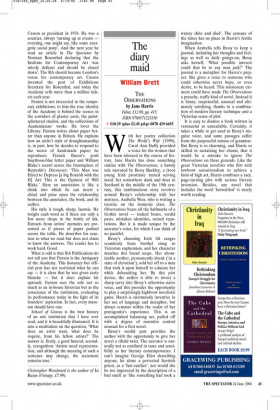The diary maid
William Brett
THE OBSERVATIONS by Jane Harris Faber, £12.99, pp. 415, ISBN 9780571223350 ✆ £10.39 (plus £2.45 p&p) 0870 429 6655 With her poetry collection The World’s Wife (1999), Carol Ann Duffy provided a voice for the women that have been silenced in the course of history. Jane Harris has done something similar with The Observations, a bawdy tale narrated by Bessy Buckley, a (too) young Irish prostitute turned serving maid. Set somewhere dank and dour in Scotland in the middle of the 19th century, this rambunctious story revolves around Bessy’s relationship with her mistress, Arabella Weir, who is writing a treatise on the domestic class. The Observations bears all the hallmarks of a Gothic novel — locked boxes, sordid pasts, mistaken identities, ruined reputations. But it is made unique by the narrator’s voice, for which I can think of no parallel.
Bessy’s charming Irish lilt ranges seamlessly from brothel slang to Victorian euphemism, and her character matches this broad scope. Her abominable mother, permanently drunk (‘in a state of elevation’), sold her off to a man that took it upon himself to educate her while debauching her. By this plot device, the author is able to invest a sharp savvy into Bessy’s otherwise naive voice, and this provides the opportunity to play a surprisingly highbrow novelistic game. Harris is enormously inventive in her use of language and metaphor, but always remains within the realm of her protagonist’s experience. This is an accomplished balancing act, pulled off with a degree of narrative control unusual for a first novel.
Bessy’s sordid past provides the author with the opportunity to give her novel a ribald twist. The narrator is naturally not as confined in taste and sensibility as her literary contemporaries. I can’t imagine George Eliot describing anyone, let alone a perverted Scottish priest, as a ‘fart-catcher’, nor would she be too impressed by the description of a bad smell as ‘like something had took a watery shite and died’. The censure of the times has no place in Harris’s fertile imagination.
When Arabella tells Bessy to keep a journal, including her thoughts and feelings as well as daily goings-on, Bessy asks herself, ‘What possible interest could that be to any man jack?’ The journal is a metaphor for Harris’s project. She gives a voice to someone who could otherwise never hope, or even desire, to be heard. This missionary element could have made The Observations a preachy, stuffy kind of novel. Instead it is funny, suspenseful, unusual and ultimately satisfying, thanks to a combination of modern literary technique and a Victorian sense of plot.
It is easy to dismiss a book written in vernacular as unreadable. Certainly, it takes a while to get used to Bessy’s singular voice, and some passages suffer from the purposeful misuse of grammar. But Bessy is so charming, and Harris so skilled in sustaining her charm, that it would be a mistake to ignore The Observations on these grounds. Like the great Victorian novelists who flirt with lowbrow sensationalism to achieve a kind of high art, Harris combines a racy, page-turning plot with serious literary invention. Besides, any novel that includes the word ‘betwattled’ is surely worth reading.



















































 Previous page
Previous page